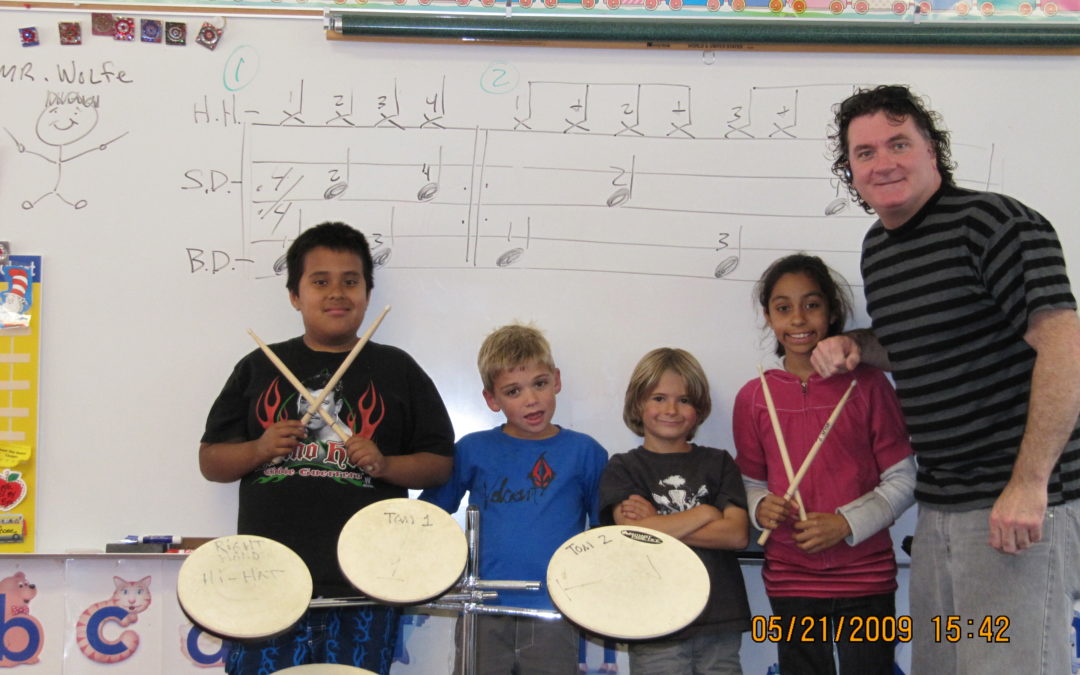Music, and how it helps in child development and brain development in general!
One of the most magical things we have in life is Music! for kids music is an essential part of their emotional and social development! Drum lessons for kids also is great way to boost the way they gain knowledge for development of math skills, thinking on multiple levels, using logical thinking and coordination with all limbs!
Music in all of all aspects and instruments play such an important role in our lives and culture.
music is present in many aspects of our lives: theater, television, movies, worship, holidays, celebrations, and government and military ceremonies. At home, music can become part of our family’s daily routine… a natural part of our way we enjoy our experiences.
Music and the Brain:
From birth, parents instinctively use music to calm and soothe children, to express their love and joy, and to engage and interact. Parents can build on these natural instincts by learning how music can impact child development, improve social skills, and benefit kids of all ages.
The Benefits of Music:
A 2016 study at the University of Southern California’s Brain and Creativity Institute found that musical experiences in childhood can actually accelerate brain development, particularly in the areas of language acquisition and reading skills. According to the National Association of Music Merchants Foundation (NAMM Foundation), learning to play an instrument can improve mathematical learning and even increase SAT scores.
But academic achievement isn’t the only benefit of music education and exposure. Music ignites all areas of child development and skills for school readiness: intellectual, social and emotional, motor, language, and overall literacy. It helps the body and the mind work together. Exposing children to music during early development helps them learn the sounds and meanings of words. Dancing to music helps children build motor skills while allowing them to practice self-expression. For children and adults, music helps strengthen memory skills.
In addition to the developmental benefits of music, why is music important? Simply put, it provides us with joy. Just think about listening to a good song on the car radio with the window down on a beautiful day. That’s joy.
Music Games for Kids of All Ages:
Children of all ages express themselves through music. Playing music for infants proves that, even at an early age, children sway, bounce, or move their hands in response to music they hear. Many preschoolers make up songs and, with no self-consciousness, sing to themselves as they play. Children in elementary school learn to sing together as a group and possibly learn to play a musical instrument. Older children dance to the music of their favorite bands and use music to form friendships and share feelings. Try these activities and games with your children to experience the pleasure and learning that music brings.
Infants and Music:
Infants recognize the melody of a song long before they understand the words. They often try to mimic sounds and start moving to the music as soon as they are physically able. Quiet, background music can be soothing for infants, especially at sleep time. Loud background music may overstimulate an infant by raising the noise level of the room. Sing simple, short songs to infants in a high, soft voice. Try making up one or two lines about bathing, dressing, or eating to sing to them while you do these activities. Find musical learning activities for infants.
Toddlers and Music:
Toddlers love to dance and move to music. The key to toddler music is the repetition of songs, which encourages the use of words and memorization. Silly songs make them laugh. Try singing a familiar song and inserting a silly word in the place of the correct word, like “Mary had a little spider” instead of lamb. Let them reproduce rhythms by clapping or tapping objects.
Preschoolers and Music:
Preschoolers enjoy singing just to be singing. They aren’t self-conscious about their ability and most are eager to let their voices roar. They like songs that repeat words and melodies, use rhythms with a definite beat, and ask them to do things. Preschool children enjoy nursery rhymes and songs about familiar things like toys, animals, play activities, and people. They also like finger plays and nonsense rhymes with or without musical accompaniment.
School-Age Children and Music:
Most young school-age children are intrigued by kids’ singalong songs that involve counting, spelling, or remembering a sequence of events. School-age children begin expressing their likes and dislikes of different types of music. They may express an interest in music education, such as music lessons for kids.
Teenagers and Music:
Teenagers may use musical experiences to form friendships and to set themselves apart from parents and younger kids. They often want to hang out and listen to music after school with a group of friends. Remember those days of basement and garage bands? They often have a strong interest in taking music lessons or playing in a band.
There is no downside to bringing children and music together through fun activities. We are able to enjoy the benefits of music from the moment we’re born, as music can soothe infants and stimulate child development. Although a good dose of Mozart is probably not increasing our brain power, it’s enjoyable and beautiful. From the pure pleasure of listening to soothing sounds and rhythmic harmonies, to gaining new language and social skills, whatever the setting – a quiet room at home with family, a large grassy field filled with people, or a busy classroom – music can enliven and enrich the lives of children and the people who care for them.
All Music lessons, Drum lessons for all ages… Drum lessons for kids will always help them for the rest of their life because having drumming or music in their life/ background also gives them a certain confidence and good feeling of accomplishment and pride about themselves.
Music is ALWAYS a Great idea!!!

